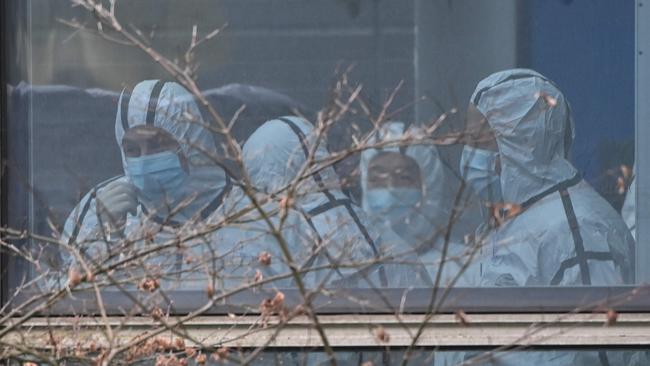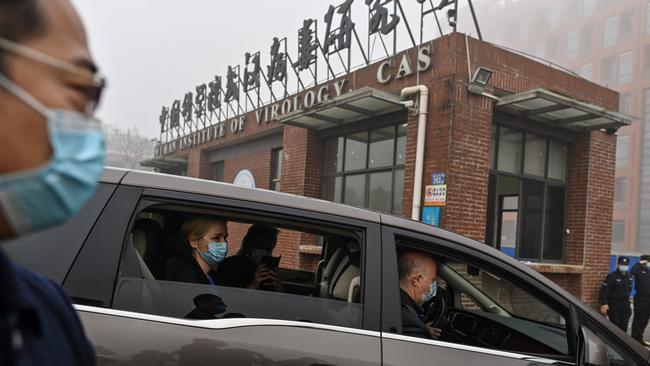The Covid Cassandras: premonitions of a pandemic
The man behind The Big Short has now told the extraordinary story of the Wolverines — maverick scientists who warned of a coming pandemic and were ignored.

In front of Joe DeRisi were the Jasons. He knew this because the mysterious navy officer who had invited him to the top-secret basement meeting told him that was the group’s name. He also knew that because in this conference of serious military men, convened to consider the serious problems of the time, each had a name badge saying “Jason”.
It was “cool … Tom Clancy shit”, thought DeRisi as his contact, an “old guy” called Jason, and also clearly not called Jason, turned to him and said, “It’s like going down the rabbit hole, son.”
In Southeast Asia a novel virus was killing hundreds and DeRisi, a professor and scientist at the University of California San Francisco, was here to talk to the Jasons about his invention, a chip that could identify any known virus.
Back then, in 2003 amid the first Sars epidemic, viruses were on people’s minds. He never knew what they made of his talk. Afterwards he had to leave lest he hear the next talk, titled The Night Fist. But, judging by how the country reacted 17 years later, the generals did not take it seriously enough.
The Jasons are not the only group in the United States with a silly name. In January 2020, when a new virus arrived and did not stop in Asia this time, the Wolverines formed. They were a shadowy resistance group of civil servants and health officials who worried about the pandemic at a time when much of officialdom did not.
They had models showing the spread of disease. They had “roughneck epidemiologists” calculating case fatality rates on the fly. They included scientists who had analysed the 1918 flu pandemic and concluded that, contrary to orthodoxy, with enough social distancing you could stop a virus in its tracks.
Later the Wolverines let in a woman called Charity Dean.
Dean is, author Michael Lewis explains, a maverick health officer who, like the hero of a 1970s cop show, does not care about pen-pushers in city hall. She is the kind of devil-may-care civil servant who would, and did, take out a cadaver’s lung with garden shears in a car park, just to stick it to the man (it’s a long story).
When the Wolverines got in touch Dean was high up in California public health. They wanted her to work clandestinely to get their anti-pandemic policies in place. They were not disappointed. This all-male group bestowed upon her the honour of “Wolverette”.

How do you tell the tale of this pandemic? How do you write a book about something this big? How do you do so when the pandemic is still raging, when Indian hospitals are collapsing, when we don’t know the ending?
Lewis’s answer: don’t tell the tale of the pandemic. Tell, as his subtitle explains, a story of the pandemic. His book about the financial crisis, The Big Short, focused on the few people who predicted, with their money, the calamity to come. In The Premonition he tells the tale of the people who, in those frenzied months before the morgues filled, did the same, and tried and failed to make a difference.
When the pandemic began, the book’s dust jacket explains, “few really understood the magnitude of what was happening”. Among those who did were DeRisi and the Wolverines, “a small group of scientific misfits”. Lewis is superb at this kind of thing. It is tremendous fun, tremendously told. It is a measure of his skill that he can talk about epidemiologists who call themselves “Wolverines” and not make them sound like utter ninnies.
There is a lot to take from it – about the inertia of the US civil service, about the “malignant obedience” of middle managers, about how people fearful of the pandemic were treated with the “wary indulgence of the sane in the presence of the fanatic”.
Equally, it is hard to tell how much significance to place on it. The personal focus is the book’s strength and, in the sense that we are meant to take a wider message, its weakness.
Are these really the lone mavericks we are led to believe? Occasionally some chap called Neil Ferguson pops up, and you get a sense the Wolverines are not alone, or that their “roughneck epidemiology” is not quite so revolutionary. Equally it may be that the US Centres for Disease Control really is, as his interviewees tell it, the useless laggard of international health. Or it may be that within that organisation too, at the same time, you could find people sounding the alarm and trying their best.

Being worried about pandemics is not a niche activity. In January last year, as science editor of The Times, I attended a press conference in London about coronavirus, and it was brimming with scientists warning about apocalypse. In February 2020 in the US I attended other press conferences, at which Cassandras – none of them Wolverines – were not in short supply either.
Lewis describes an occasion when DeRisi was asked his pandemic priorities and replied, “Number one is testing.” Yes, he is right. Equally though, at around the same time, Michael Ryan of the World Health Organisation was going on TV urging countries to “test, test, test”.
Then there is the far bigger problem, that even if these are the lone voices in the wilderness, that wilderness is just one country. A pandemic is global, but this book is only about characters in the US, a country that is – doubtless an unaccustomed feeling for it – a relatively minor player in the pandemic story.
For British readers that is an obvious and significant flaw in the book. How much do they care about the idiosyncrasies of one country’s failure when they have their own failures to consider?
The stories that still need to be told, the ones where it is possible individuals really made a difference, are elsewhere. They are in China, where the decision was taken – by someone, in what meeting? – to lock down fast and hard. They are in Italy, where the equally bold decision was taken to copy this approach in a democracy. Once that happened, the rest of the world followed, Jasons and Wolverines and all.
But it is wrong to criticise a book for not being a different book. Lewis’s tale is instead perhaps best thought of as being to the pandemic what Band of Brothers is to the Second World War. The real story was about the gruelling attrition of the Russian front, the geography of the English Channel, and the finale – the Second World War version of the vaccine – of the atomic bomb. Yet a much more personal tale of plucky Americans fighting, failing and occasionally winning on the front line is easier to understand, and contains its own truths.
Among those truths, in a familiar lesson for much of the world this year, is the danger of hubris. Before 2020 two of the Wolverines, confident their advice to lock down fast and early would be followed, had considered a thorny problem: what if they were too successful?
“What if we do all these things and the result is we have a very mild epidemic? And people look around and say, ‘Why did we do all this?’ ” They concluded that at least one country would screw up, and they could point to that as the counterexample. As 2020 unfurled, they told Lewis, “We are the bad example for the rest of the world.”
The Premonition: A Pandemic Story, by Michael Lewis (Allen Lane, 320pp)
The Times

To join the conversation, please log in. Don't have an account? Register
Join the conversation, you are commenting as Logout